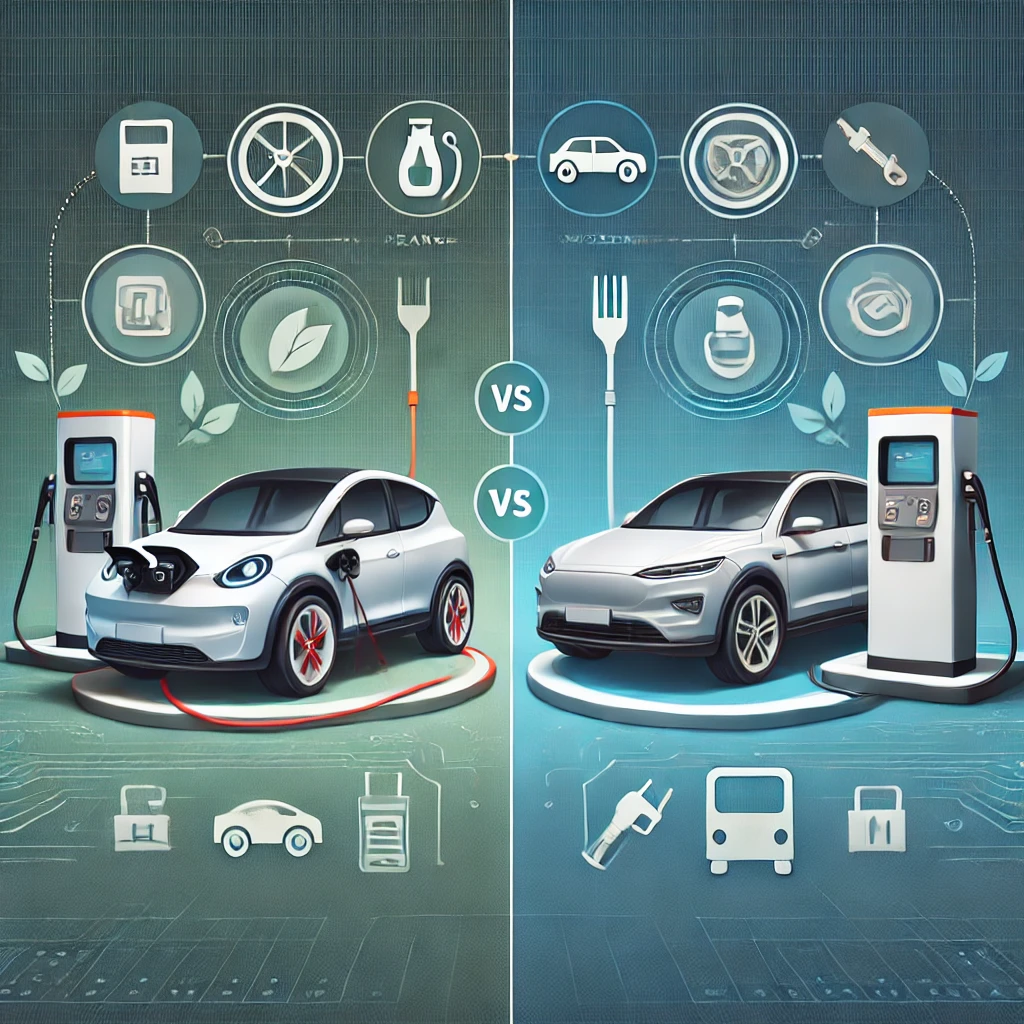
The automotive world is changing rapidly, and one of the biggest decisions today’s drivers face is choosing between an electric vehicle (EV) and a traditional gasoline-powered car. Both types of vehicles have their own sets of advantages and disadvantages, and the right choice for you depends on a range of factors—from your budget and driving habits to your environmental concerns and access to charging infrastructure.
In this guide, we’ll explore the key differences between electric and gasoline cars, helping you make an informed decision based on performance, cost, convenience, and long-term benefits.
Electric Cars: Benefits and Drawbacks
Electric cars have surged in popularity over the past decade, driven by advancements in battery technology and a growing awareness of environmental sustainability. But while EVs are becoming more common, they’re not without their challenges.
Advantages of Electric Vehicles (EVs)
- Eco-Friendly: Electric cars produce zero tailpipe emissions, making them a far greener choice for the environment. By driving an EV, you can significantly reduce your carbon footprint, especially if you charge it using renewable energy sources.
- Lower Operating Costs: Electricity is generally cheaper than gasoline, which can lead to savings on fuel costs. Additionally, EVs have fewer moving parts than gasoline cars, resulting in lower maintenance expenses (no oil changes or exhaust system repairs).
- Quiet and Smooth Driving: EVs offer a quiet and smooth driving experience, thanks to their electric motors, which deliver instant torque for quick acceleration.
Drawbacks of Electric Vehicles (EVs)
- Higher Upfront Costs: Despite recent price reductions, electric cars tend to have a higher purchase price than comparable gasoline vehicles, though this gap is closing with government incentives and falling battery costs.
- Range Anxiety: One of the biggest concerns with EVs is their driving range. While most modern EVs can travel between 200-300 miles on a single charge, longer road trips may require careful planning around charging stations.
- Charging Time: Refueling a gasoline car takes just minutes, but charging an electric vehicle can take anywhere from 30 minutes (with a fast charger) to several hours, depending on the charging station and battery size.
Gasoline Cars: Pros and Cons
Despite the rise of electric cars, gasoline-powered vehicles remain the dominant choice for most drivers due to their established infrastructure, lower upfront costs, and familiarity. However, they also come with their own set of trade-offs.
Advantages of Gasoline Cars
- Longer Range: Gasoline cars generally offer a longer range than most electric cars, making them ideal for long-distance travel without the need for frequent stops to refuel.
- Faster Refueling: Filling up at a gas station takes just a few minutes, unlike electric cars, which require time to recharge.
- Lower Purchase Price: Gasoline vehicles tend to be more affordable upfront compared to electric cars, especially if you’re looking for entry-level models.
Drawbacks of Gasoline Cars
- Environmental Impact: Gasoline cars produce emissions that contribute to air pollution and climate change. If sustainability is a priority for you, an electric vehicle might be a better fit.
- Higher Maintenance Costs: Gasoline cars have more complex engines and components, which means they require more frequent maintenance. Over time, this can add to the cost of ownership, especially as the car ages.
- Fuel Costs: While gasoline prices fluctuate, fuel costs can add up over time, especially for drivers who commute long distances or frequently take road trips.
Performance Comparison: Electric vs. Gasoline Cars
When it comes to performance, electric and gasoline cars each have their strengths:
- Torque and Acceleration: Electric cars are known for their instant torque, which means they can accelerate more quickly than gasoline cars. This makes EVs particularly fun to drive in city traffic, where quick acceleration from a standstill is beneficial.
- Driving Dynamics: Gasoline cars tend to offer better driving dynamics at high speeds and are often favored by enthusiasts for their engine sound and traditional transmission systems. However, some high-end electric models, like those from Tesla and Porsche, deliver impressive performance that rivals top gasoline-powered sports cars.
Fueling and Charging Infrastructure
One of the most significant differences between electric and gasoline cars is how you refuel or recharge them:
- Gas Stations: Gas stations are ubiquitous, making refueling a gasoline car quick and convenient no matter where you are.
- EV Charging Stations: While the number of EV charging stations is growing rapidly, they are still less common than gas stations. If you live in a city or have access to a home charger, this may not be a problem, but in rural areas or for long-distance travel, you may need to plan your route around charging points.
Environmental Impact of Electric and Gasoline Cars
When it comes to the environment, electric cars have a clear advantage:
- Tailpipe Emissions: Electric cars produce zero tailpipe emissions, helping to reduce air pollution and greenhouse gas emissions. Gasoline cars, on the other hand, emit carbon dioxide and other pollutants, contributing to climate change.
- Lifecycle Emissions: While the manufacturing of electric vehicles, particularly their batteries, generates more emissions than gasoline cars, EVs typically offset this over their lifetime due to their cleaner operation.
You can also read: How to Decide Between Sedan, SUV, or Hatchback: Car Model Comparison
Cost Differences: Upfront and Long-Term Expenses
Although electric vehicles tend to have a higher purchase price, their long-term costs can be lower:
- Upfront Costs: Gasoline cars generally have a lower sticker price, but many countries offer tax credits, rebates, and incentives to make electric vehicles more affordable.
- Fuel and Maintenance Savings: EVs are cheaper to operate in the long run, thanks to lower fuel costs and fewer maintenance requirements (no oil changes, spark plugs, or exhaust system repairs).
In the next sections, we’ll dive deeper into how your driving habits, the availability of government incentives, and resale values should influence your decision when choosing between an electric or gasoline car. We’ll also explore hybrid options, which offer the best of both worlds for many drivers.